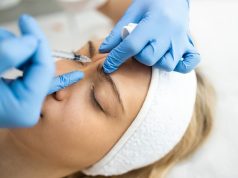Decrease in number of melanocytes and concentration of melanin in melasma skin after surgery
FRIDAY, Feb. 6, 2015 (HealthDay News) — Erbium:YAG lasers can effectively treat refractory melasma, according to a study published in the February issue of the International Journal of Dermatology.
Enayat Attwa, M.D., from the Zagazig University in Egypt, and colleagues examined the efficacy of erbium:YAG lasers in the treatment of refractory melasma in a study involving 15 female patients. Participants underwent full-face skin resurfacing using an erbium:YAG laser. The authors examined histopathological and ultrastructural changes in melasma and control skin before and after surgery.
The researchers found that, compared with normal skin, in melasma lesions there was an increase in the amount of melanin, staining intensity, and number of epidermal melanocytes. An increased number of mature melanosomes was seen in keratinocytes and melanocytes on electron microscopic analysis, with more marked cytoplasmic organelles in melasma skin than in biopsy specimens from normal skin. In melasma skin the number of melanocytes and concentration of melanin decreased after surgery, and there were dramatic decreases in the mean melasma area and severity index score.
“Erbium:YAG laser resurfacing effectively improves melasma; however, the almost universal appearance of transient postinflammatory hyperpigmentation necessitates prompt and persistent intervention,” the authors write.
Copyright © 2015 HealthDay. All rights reserved.








